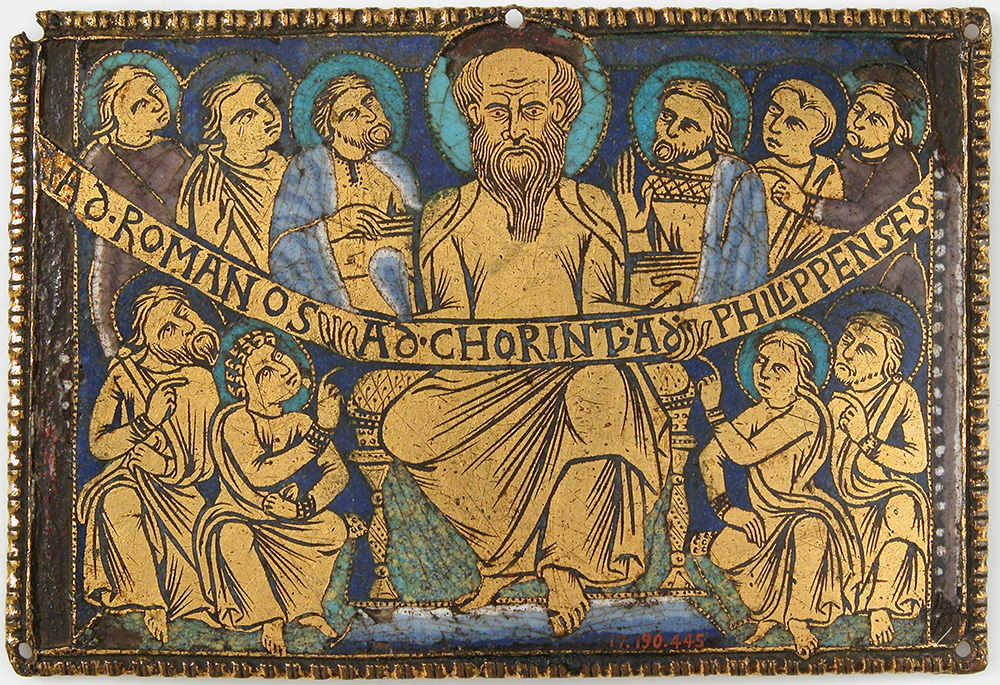
"Plaque with St. Paul and His Disciples," a possibly British, ca. 1160–80 copper champlevé enamel; the plaque's inscription refers to the epistles Paul addressed to the various early Christian communities (Romans, Corinthians, Philippians) among whom he traveled. (Metropolitan Museum of Art)
In today's Gospel we hear Jesus describe three absolute impediments to being his disciple. He says nothing about belief in the Trinity or the Real Presence, declares no rules or laws to be indispensable. Instead, what disqualifies a person from discipleship is the prioritizing of certain people (clan, nationality, race, gender) over unbounded love, avoiding the suffering entailed in being a messenger of the Gospel and prioritizing possessions.
How did Jesus give witness to a life given to God and nothing else?
Our first reading asks, "Who can know God's counsel . . . conceive what the Lord intends?" That seems to be the question that guided Jesus' life and, therefore, his ministry: What does God intend for us?
Theologian Bernard Loomer used the term "S-I-Z-E" to describe God's intention for our growth as human beings, writing, "By size I mean the stature of a person's soul, the range and depth of his love, his capacity for relationships. I mean the volume of life you can take into your being and still maintain your integrity and individuality. … I mean the strength of your spirit to encourage others to become freer. … I mean the magnanimity of concern to … enable others to increase in stature."
Does that not sound like a description of how Jesus lived?
Jesus revealed that the vocation of the human is to grow continually in the range and depth of our relationships with God and others. The minute he began his public mission, he opened himself to deep encounter with everyone and everything. Starting with a debate with the devil, he gave individual and genuine attention to each person with whom he had contact, be they friend or foe. And, as with us, the stature of his soul grew with each relationship.
Jesus' attention to the outcast meant that he identified with them such that he suffered rejection with them. His strength of soul and generosity, his prioritizing people over institutions or rules led to his condemnation. He knew what he was doing.
People who share Jesus' magnanimity of concern for others live from a merciful heart. Mercy, as used in the Gospels, describes an unrelenting desire to relieve another's suffering. We see that in Jesus' seeking the good of others — all others — over his wants and even his needs.
Disciples are people who, like Jesus, have been captivated by God's love. They feel impelled to share that experience.
Paul's letter to Philemon offers an example of that sort of love. Paul had left his past behind and he knew the sufferings of discipleship. He wrote this letter intending to do good for two people: his convert, Philemon, and his beloved companion, Onesimus. This letter could sound manipulative, with Paul making an offer Philemon can't refuse if he wants to look like a disciple. More likely, Paul was evangelizing. Paul's request expressed his desire that both Onesimus and Philemon might "increase in stature" or S-I-Z-E.
When Jesus explained the requirements of discipleship, he spoke to a massive crowd as well as his close companions in mission. What he said sounds radical, even severe. He wanted anyone thinking of being his disciple to realize that following him could be unexpectedly and uncontrollably hard.
Advertisement
Ironically, Jesus' requirements offered absolute freedom. People whose only ambition is to grow in relationship with God and all that is of God can abandon themselves to love. People who are unafraid of suffering cannot be controlled. People whose sense of self and personal dignity comes from their loving relationships have nothing to lose. Therefore, one of the rarely mentioned but essential marks of discipleship is freedom, a freedom like that of Jesus which springs from relationship with God and the work of the Spirit.
What about us would-be disciples whose deliberations are timid and plans unsure, who understand so little? Perhaps the greatest thing about being human is our capacity to grow — to increase in S-I-Z-E. Facilitating growth could describe Jesus' intention in dealing with every person he met, just as he grew through his ongoing relationship with his Father and all of creation. The reign of God flourishes as people grow in their relationships.
Interpersonal relationships are unlimited in capacity for growth. They always move toward greater depth, breadth and intensity. Growth in being human includes an appropriate care and respect for everything in God's creation. The mountains, trees, desert and ocean, eagles and zebras, mice and bears have their own unlimited dignity.
The more we take in all of creation, the more we are following Christ. Our capacity to love freely, to suffer with others and to love everything without controlling it is unlimited. This kind of loving makes us disciples.
